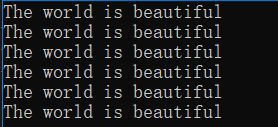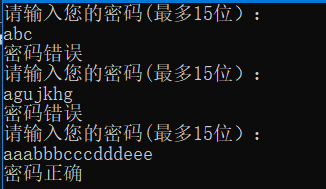目录
一、auto
声明自动变量
- 在任何类、结构、枚举、联合和函数中定义的变量视为局部变量,所有局部变量默认都是auto,一般省略不写。
#include<stdio.h> int main() { auto int a = 100; printf("%d",a); }但有的编译器不允许出现这种情况,会认为重复。
- 只使用auto修饰变量,默认类型为整型。
#include<stdio.h> int main() { auto a = 100; printf("%d",a); }
二、short
声明短整型变量或函数
#include<stdio.h> int main() { short a = 100; printf("%d",a); }short fun();
三、int
声明整型变量或函数
四、long
声明长整型变量或函数
五、float
声明浮点型变量和函数
六、double
声明双精度变量或函数
七、char
声明字符型变量和函数
八、struct
声明结构体变量或函数
struct student{ char name[15];//名字 int age;//年龄 int grade;//年级 int score;//成绩 };struct student{ char name[15]; int age; int grade; int score; }; struct student return_student(char* name,int *age,int* grade,int* score);
九、union
声明共用体变量
- 共用体变量的字节长度跟内存最大的成员变量的长度有关,且为4的倍数
#include<stdio.h> union student{ char name[16]; int age; int grade; int score; }; int main() { student stu; printf("%d\n",sizeof(stu)); }
#include<stdio.h> union student{ char name[15]; int age; int grade; int score; }; int main() { student stu; printf("%d\n",sizeof(stu)); }
- 共用体使用了内存覆盖技术,同一时刻只能保存一个成员的值,如果对新的成员赋值,就会把原来成员的值覆盖掉。
#include<stdio.h> union student{ char name[15]; int age; int grade; int score; }; int main() { student stu; stu.age = 100; printf("%d\n",stu.age); stu.score = 650; printf("%d\n",stu.grade); printf("%d\n",stu.age); }
十、enum
声明枚举型变量
枚举中的变量实际是整型。
#include<stdio.h> enum Month {Jan=1,Feb,Mar,Apr,May,Jun,Jul,Aug,Sep,Oct,Nov,dec}; int main() { Month m = Feb; printf("%d\n",m); if(m==Feb) { printf("二月\n"); } }
如果不写Jan=1的话,默认Jan = 0
十一、typedef
给数据类型取别名
#include<stdio.h> typedef enum Month {Jan=1,Feb,Mar,Apr,May,Jun,Jul,Aug,Sep,Oct,Nov,dec}abc; int main() { abc m = Feb; printf("%d\n",m); }
十二、const
声明只读变量
#include<stdio.h> int main() { const int a = 100; a = 99; }如果企图更改a的值,就会发生错误。
十三、unsigned
声明无符号类型变量或函数
#include<stdio.h> int main() { unsigned short a = -1; printf("%d",a); }

十四、signed
声明有符号类型变量或函数
#include<stdio.h> int main() { signed short a = -1; printf("%d",a); }
一般不写,因为默认。
十五、extern
引用变量或函数
- 引用本文件的全局变量变量或函数(位于main之后且main之前未声明)
#include<stdio.h> int main() { extern int a; printf("%d",a); } int a = 100;
- 引用其它文件的全局变量或函数
三个文件: demo.h demo.cpp main.cpp
demo.h
#ifndef _DEMO_H_ #define _DEMO_H_ extern int a; extern int b; int add(int a, int b); #endif /* #pragma once extern int a; extern int b; */demo.cpp
#include "demo.h" int a = 10; int b = 20; int add(int p, int q) { return p + q; }main.cpp
#include "demo.h" #include<stdio.h> int main() { printf("%d",add(a,b)); }
十六、register
声明寄存器变量
更快
注意事项:
只能修饰局部变量,因为CPU的内存有限
- CPU可以接受此变量
- 不能使用&对变量取址
- 不一定成功
#include<stdio.h> int main() { register int x = 10*10; printf("%d",x); }
十七、stastic
声明静态变量
函数结束时,静态变量的值并未消去。
#include<stdio.h> int fun() { static int x = 0; x++; return x; } int main() { printf("%d\n",fun()); printf("%d\n",fun()); printf("%d\n",fun()); printf("%d\n",fun()); printf("%d\n",fun()); }
十八、volatile
避免编译器优化而忽略该条指令
volatile int a;
十九、void
声明无类型指针,声明函数无返回值或无参数
二十、if
条件语句
#include<stdio.h> int main() { int x = 1; if(x==1) printf("SUCCESS"); }
二十一、else
条件语句的分支
#include<stdio.h> int main() { int x = 2; if(x==1) printf("SUCCESS"); else printf("FAIL"); }
二十二、swich
条件语句
#include<stdio.h> int main() { int n; scanf("%d",&n); switch (n) { case 1:case 3:case 5:case 7:case 8:case 10:case 12: printf("这月有31天"); //TODO break; case 2:printf("这月有28天或29天"); //TODO break; default: printf("这月有30天"); //TODO break; } }
二十三、case
参考二十二
二十四、for
循环语句
#include<stdio.h> int main() { for(int i=1;i<10;i++) { for(int j=1;j<=i;j++) { printf("%2d * %2d = %2d ",j,i,i*j); } printf("\n"); } }
二十五、do
循环语句
#include<stdio.h> int main() { int count = 5; do{ printf("The world is beautiful\n"); }while(count-->0); }
二十六、while
循环语句
#include<stdio.h> int gcd(int a, int b) { int t; while(b!=0) { t=a%b; a=b; b=t; } return a; } int main() { int a,b; printf("请输入a和b的值:\n"); scanf("%d %d",&a,&b); printf("a和b的最大公约数为%d",gcd(a,b)); }
二十七、goto
跳转语句
#include<stdio.h> #include<string.h> int main() { char password[16]; char Password[16]; strcpy(Password,"aaabbbcccdddeee"); password[15] = '\0'; A: printf("请输入您的密码(最多15位):\n"); scanf("%s",&password); if(!strcmp(Password,password)){ printf("密码正确\n"); } else{ printf("密码错误\n"); goto A; } }
二十八、continue
结束当前循环,进入下个循环
#include<stdio.h> int main() { for(int i=0;i<10;i++) { if(i==5) continue; else printf("%d\n",i); } }
二十九、break
结束循环
#include<stdio.h> int main() { for(int i=0;i<10;i++) { if(i==5) break; else printf("%d\n",i); } }
三十、default
参考二十二
三十一、sizeof
计算数据类型长度
#include<stdio.h> int main() { printf("%d",sizeof(int)); }
三十二、return
函数返回


































 3万+
3万+











 被折叠的 条评论
为什么被折叠?
被折叠的 条评论
为什么被折叠?










